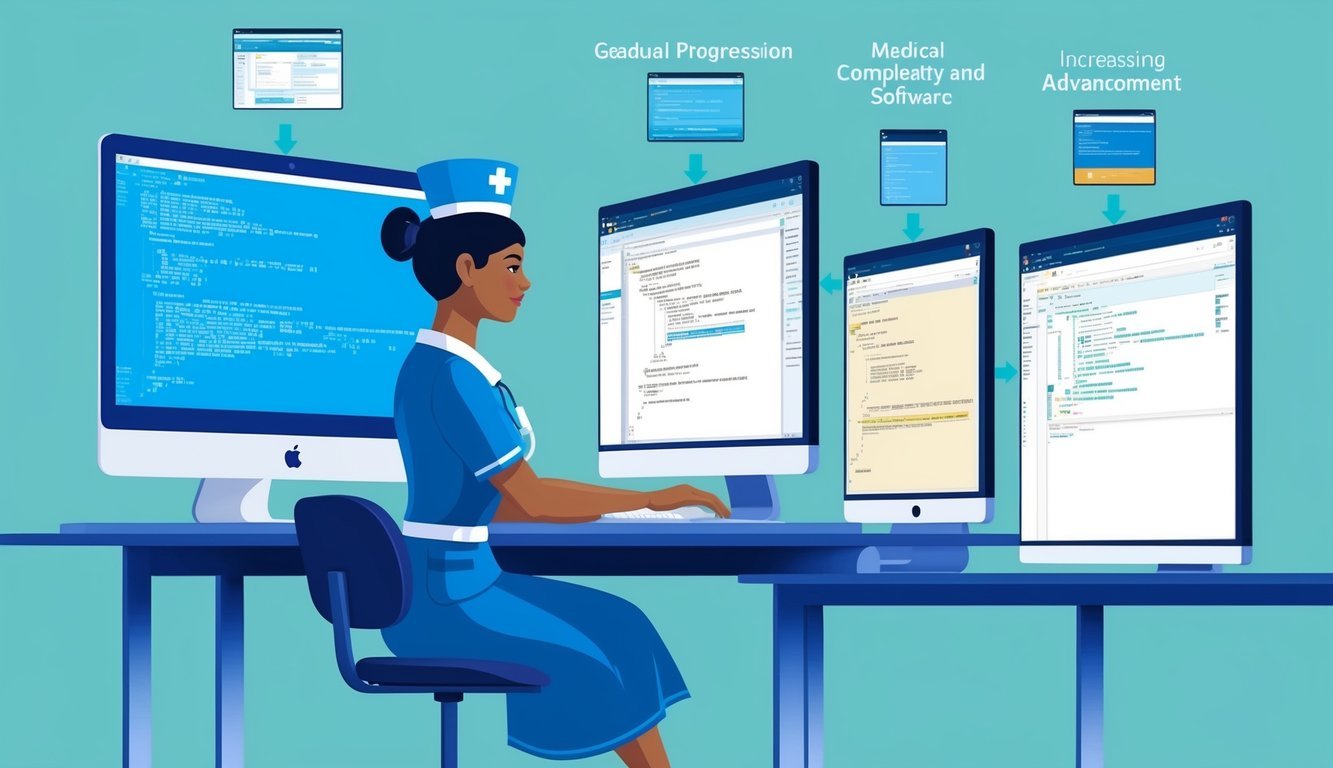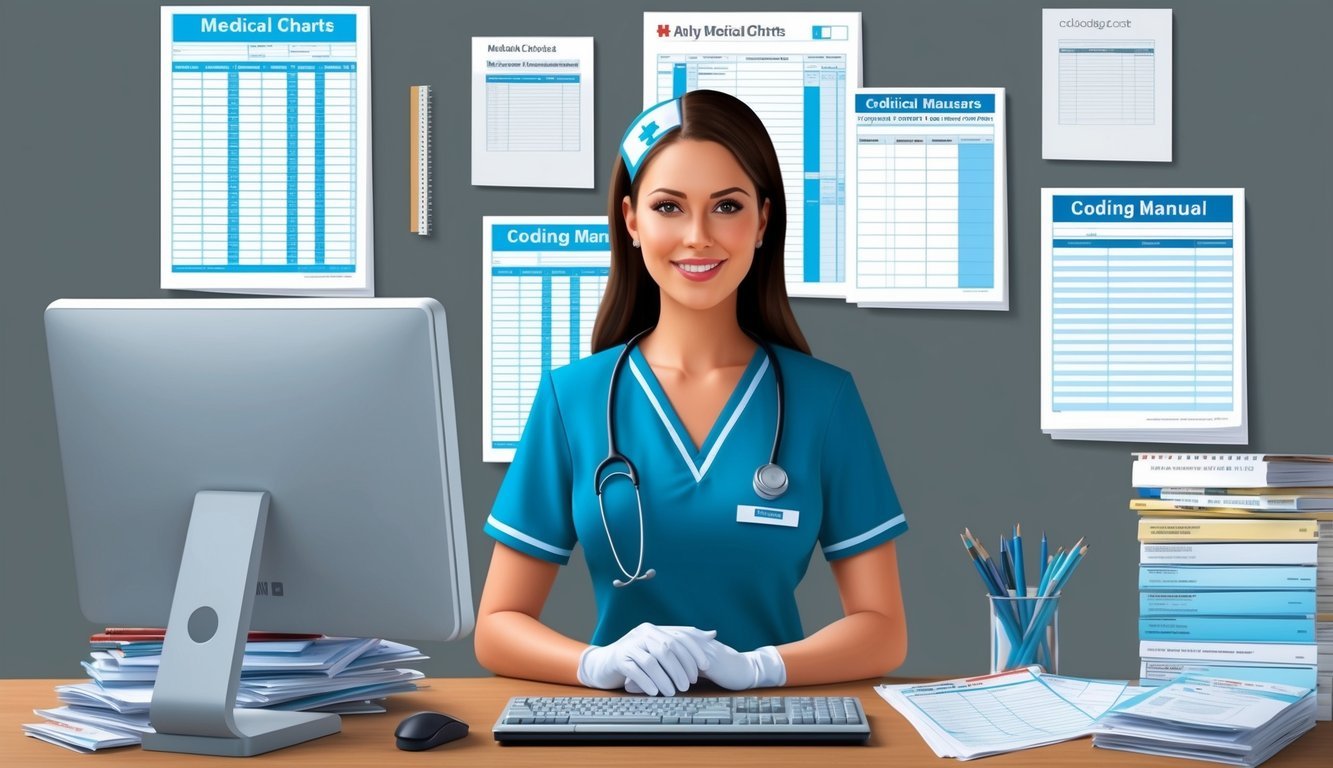Nurse coding is an essential role in the healthcare industry, combining nursing expertise with medical coding skills.
Nurse coders facilitate proper billing and ensure that healthcare providers are compensated for their services by accurately translating patient information into standardized codes.
This ensures that patients receive the care they need while supporting the financial health of healthcare facilities.
In this field, you’ll find opportunities to make a significant impact on patient care and financial outcomes in healthcare systems.
As a nurse coder, you will navigate complex medical records, work closely with healthcare teams, and be an integral part of the revenue cycle management process.
Your ability to analyze and code medical information accurately directly affects the overall efficiency of healthcare services.
Exploring a career in nurse coding can open doors to various paths within the healthcare system.
Understanding the responsibilities, challenges, and necessary skills for this role will help you determine if it aligns with your career goals in nursing or healthcare administration.
Key Takeaways
- Nurse coding plays a critical role in accurate billing and patient care.
- Strong coding skills can lead to diverse career opportunities in healthcare.
- The demand for skilled nurse coders is expected to grow as healthcare systems evolve.
The Role of Nurse Coders

Nurse coders combine nursing expertise with medical coding skills to ensure accurate billing and compliance in healthcare.
They play a vital role in translating clinical data into codes that are essential for health records and billing processes.
Essential Skills and Knowledge for Nurse Coding
As a nurse coder, you need a solid foundation in skills and knowledge specific to both nursing and coding.
You must possess medical terminology, anatomy, and physiology knowledge to understand patient records and the services provided.
In addition, you must be proficient in various coding systems, such as ICD-10 and CPT.
Familiarity with these coding classifications is vital for accurate coding.
Further, you need strong analytical skills to assess documentation for completeness and correctness.
Here is a quick list of important skills:
- Attention to detail
- Analytical thinking
- Communication skills
- Problem-solving abilities
These skills ensure accurate coding and help maintain the financial integrity of your healthcare facility.
Nursing Degree and Coding Certifications
Holding a nursing degree is essential for a nurse coder.
It provides you with the clinical background needed to interpret medical records accurately.
With this degree, you can transition into coding roles and leverage your nursing experience.
To enhance your qualifications, consider obtaining coding certifications.
Several certifications are available, including:
- Certified Professional Coder (CPC)
- Certified Inpatient Coder (CIC)
- Certified Outpatient Coder
- Certified Coding Specialist (CCS)
- Certified Risk Adjustment Coder
- Certified Professional Medical Auditor (CPMA)
These certifications demonstrate your expertise and commitment to the field.
They can also improve your job prospects and potentially lead to higher salaries.
Training programs and online resources can help you prepare for these certifications effectively.
For more details, check out organizations like AAPC or AHIMA.
Healthcare Systems and Medical Coding
Medical coding plays a crucial role in healthcare systems by ensuring accurate documentation and billing.
It helps healthcare providers manage patient records effectively and facilitates communication across various healthcare settings.
Introduction to Medical Billing and Coding
Medical billing and coding are essential for the operational efficiency of healthcare providers.
Medical coding involves translating medical diagnoses, procedures, and services into standardized codes, such as ICD-10-CM for diagnoses and CPT for procedures.
| Code Type | Example | Description |
|---|---|---|
| ICD-10-CM | E11.9 | Type 2 diabetes without complications |
| CPT | 99213 | Established patient office visit |
| HCPCS | A0428 | Ambulance service mileage |
Accurate coding ensures healthcare providers can bill correctly and receive payment for services rendered.
It also affects patient records, helping to maintain comprehensive and organized medical histories.
Relevance of Coding in Healthcare Documentation
Coding is vital in healthcare documentation for several reasons.
First, it provides essential data for healthcare analytics, affecting policy decisions and resource allocation.
Properly coded patient records help in:
- Insurance Claims: Correct codes ensure timely reimbursement from insurers.
- Patient Care: Accurate coding reflects patient history, aiding in treatment and care planning.
- Regulatory Compliance: Adhering to coding standards helps avoid penalties and audits.
Coding also supports clinical research and public health data reporting.
By using standardized codes, you contribute to a unified approach in managing health information across various healthcare systems, from hospitals to outpatient clinics.
Career Path and Progression

Transitioning from nursing to coding offers opportunities for career advancement and improved work-life balance.
Understanding the steps involved can help you successfully navigate your path as a nurse coder.
From Registered Nurse to Nurse Coder
Many nurses find that their clinical experience prepares them well for a career in medical coding.
As a registered nurse, you possess valuable knowledge about medical terminology and patient care.
This background is beneficial when interpreting medical records and ensuring accurate billing.
To become a nurse coder, you might choose to enroll in online medical billing and coding programs.
These programs often cover essential coding systems like ICD-10 and CPT.
After completing the program, you may seek positions that focus on coding within healthcare settings.
The transition can also lead to higher salaries than traditional nursing roles.
As you gain experience in coding, your value and earning potential as a nurse coder will likely increase.
Certification and Continuing Education
Obtaining certification can enhance your career prospects as a nurse coder.
Two prominent organizations offering certifications are the American Academy of Professional Coders (AAPC) and the American Health Information Management Association (AHIMA).
These certifications demonstrate your expertise and commitment to the field.
To achieve certification, you typically need to pass an exam.
Continuing education is crucial in maintaining your certification and staying updated on coding standards and regulations.
Participating in AAPC membership provides access to resources, networking, and educational opportunities.
Furthermore, many employers prefer certified coders, which can improve your job options and work-life balance.
Regularly updating your skills through workshops or seminars can also contribute to your professional growth in the medical coding career.
Industry Standards and Practices
Navigating the landscape of nurse coding involves understanding various billing systems and ensuring compliance with clinical documentation standards.
These factors are crucial for accurate reimbursement and maintaining the integrity of patient records.
Understanding Billing Systems and Insurance Claims
Billing systems are essential for processing healthcare claims and ensuring healthcare providers receive their payments.
You must be familiar with different components of these systems, including HCPCS Level II codes, which identify non-physician services, equipment, and supplies.
Key elements include:
- Revenue Cycle Management: This refers to monitoring and managing claims, from patient registration to final payment.
- Insurance Claims Process: Understand how to correctly submit claims to various payers to avoid issues or delays in payment.
A deep understanding of your medical office procedures is vital.
Familiarization with federal and state regulations can aid in more effective billing and coding practices.
Compliance with Clinical Documentation Standards
Clinical documentation is critical in supporting the necessity of services billed to insurance.
You need to ensure accurate and detailed documentation to comply with regulations and avoid denials.
Consider these important aspects:
- Accuracy: Record all relevant patient information accurately to support the services billed.
- Consistency: Maintain consistent documentation across all records and billing to ensure clarity.
Following ethical standards, as outlined by the American Health Information Management Association, is essential.
This compliance safeguards against potential legal and financial issues.
Regular training sessions can help you keep abreast of updates in documentation standards and codes.
Opportunities and Challenges in Nurse Coding

Nurse coding offers unique opportunities and challenges.
Understanding the job market and the balance between nursing knowledge and coding accuracy is crucial for success in this field.
Job Market and Demand for Nurse Coders
The job market for nurse coders is growing due to increased demand for accurate medical billing and coding in healthcare.
The rise in healthcare services means more professionals are needed to handle medical records and coding tasks.
According to the U.S. Bureau of Labor Statistics, the average annual salary for medical coders is around $50,000.
In larger cities or specialized roles, salaries can exceed $70,000.
Organizations often seek candidates with an online nursing degree or similar qualifications.
Many positions now allow for remote work, providing flexibility.
This shift to telecommuting can lead to improved work-life balance for you as a nurse coder.
Balancing Nursing Expertise with Coding Accuracy
You must effectively combine your nursing knowledge with coding skills for success.
Accurate coding is essential for proper billing and compliance with regulations.
A misunderstanding or error in coding can lead to significant financial repercussions for healthcare providers.
As a medical records specialist, you should be familiar with ICD-10 and CPT codes.
Continuous education is vital since coding guidelines change frequently.
Staying updated on the latest coding practices enhances your value in the job market.
Pursuing certification in coding can also improve your employment prospects and salary potential.
In this role, you bridge the gap between clinical practice and administrative duties, ensuring high standards in patient care through accurate coding.
Frequently Asked Questions

In this section, you will find detailed answers to common questions about nurse coding.
These FAQs cover certification requirements, job opportunities, salary expectations, and more.
What are the certification requirements for a nurse interested in coding?
To work as a nurse coder, you often need to pursue additional training in medical coding.
Common certifications include the Certified Professional Coder (CPC) and Certified Coding Specialist (CCS).
Many programs recommend having a nursing background and completing coursework in coding.
For more details, visit Nurse Journal.
How can nurses transition into a medical coding career?
Transitioning into a medical coding career typically involves taking coding courses and obtaining certification.
You can start by researching programs that fit your schedule and budget.
Networking with professionals in the field can also provide valuable insights and job leads.
What are the job opportunities available for nurses in the coding field?
Nurses have various job opportunities in coding, including positions in hospitals, outpatient clinics, and insurance companies.
Many organizations seek registered nurses for coding due to their medical knowledge.
You can also work as an independent contractor or consultant in this field.
What is the typical salary range for a nurse working in the medical coding profession?
The salary for a nurse coder can vary based on experience, location, and certifications.
On average, nurse coders earn between $50,000 to $70,000 per year.
Additional certifications or specializing in areas like outpatient coding can increase your earning potential.
What are the best medical coding programs suitable for nurses?
Many reputable institutions offer medical coding programs tailored for nurses.
Look for programs that provide a balance of online and in-person training.
Accreditation is also important, so ensure the program meets industry standards.
Can a registered nurse perform coding tasks remotely, and what does it entail?
Yes, registered nurses can perform coding tasks remotely.
This typically involves reviewing medical records, coding diagnoses and procedures, and ensuring accurate billing.
You’ll need to have a reliable internet connection and be comfortable using coding software for remote work.

